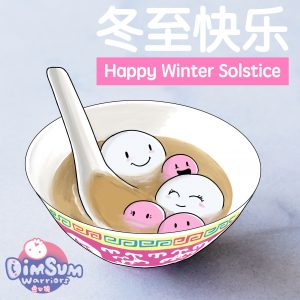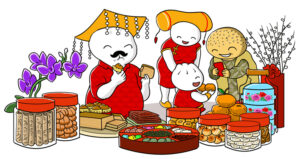HOW DO CHINESE PEOPLE CELEBRATE DONGZHI 冬至?
As they do with major astrological events, many cultures celebrate the winter solstice—not just the Chinese, but also the Japanese, Koreans, Vietnamese and other East Asians, as well as Europeans, Native Americans and Iranians.
Here’s how Dongzhi is traditionally celebrated amongst Chinese communities:
Honoring Ancestors
Ancestor worship is a part of many Chinese festivals, including Dongzhi. Families tidy up the tombs of their ancestors and also burn incense and make offerings of food.
Reuniting with Family
Similar to Chinese New Year, families reunite for a celebratory meal.
For Southern Chinese, these meals traditionally include 汤圆 tāngyuán (glutinous rice balls), as it sounds like 团圆 tuányuán, which means ‘reunion’.
Northern Chinese usually eat dumplings like 饺子 jiǎozi (steamed or boiled, and served with sauces for dipping) or 馄饨 húntún (thinner-skinned dumplings which are often served in soup).
As it’s winter, food that warms the body, such as ginger and lamb, are usually served.
Praying at the Temple
At Dongzhi, many Chinese people visit temples to pray for a good harvest and good health in the year ahead.
Counting the Nines of Winter 数九 (shǔ jiǔ)
Traditionally, Chinese people believed that Spring will arrive after nine consecutive periods of 9 days, beginning with Dongzhi.
The Nines of Winter is a folk song charting what happens during each of the nine periods.
The Nines of Winter song goes like this:
一九二九不出手
(Yījiǔ’èrjiǔ bù chūshǒu)
During the 1st and 2nd 9-day periods, you can’t show your hands (because it’s too cold)
三九四九冰上走
(sānjiǔsìjiǔ bīng shàng zǒu)
During the 3rd and 4th 9-day periods, you can walk on ice
五九六九看杨柳
(wǔjiǔliùjiǔ kàn yángliǔ)
During the 5th and 6th 9-day period, you can see the willows sprouting
七九河开
(qījiǔ hé kāi)
During the 7th 9-day period, the rivers thaw
八九雁来
(bājiǔ yànlái)
During the 8th 9-day period, the geese arrive
九九加一九,耕牛遍地走
(jiǔjiǔ jiā yījiǔ, gēng niú biàndì zǒu.)
During the last nine days, the oxen start to till the fields
Here’s a cute video sharing the background behind the Nines of Winter:
For our family, Dongzhi Festival comes right after Thanksgiving and before Christmas. It’s often the time to cuddle up with family and eat warm stews and soups. Maybe our favourite thing to do is get the body warm through hot springs 泡温泉 pào wēnquán! Our favorite place in the winter is the outdoor hotspring at Jiuzhizhe.
It’s also a quiet time of gratitude for those who came before us, and restful contemplation of how our year has gone as we prepare for all the energy and activities that will surely come with the new year.
Hope you have a wonderful Dongzhi Festival wherever you are in the world!
Here are more articles that might interest you!
-
Mid-Autumn Festival 101: A Mammoth Guide to Mooncakes, Myths and Moon Mysteries!
-
端午节: 8 Essential Things to Know About the Dragon Boat Festival
-
How Your Child Can Learn Chinese Creatively


